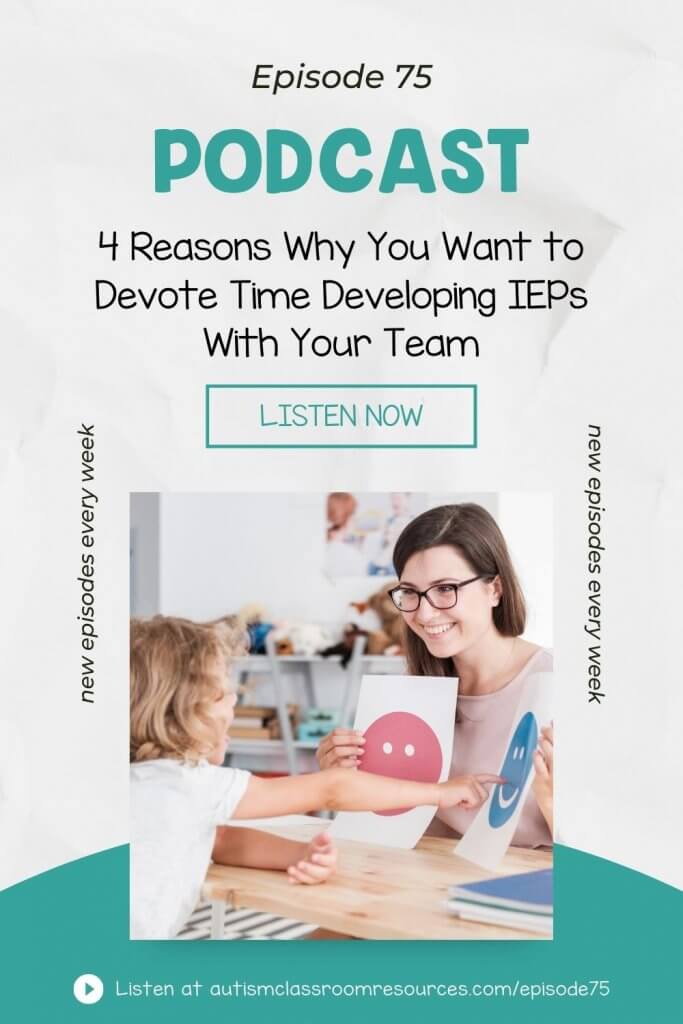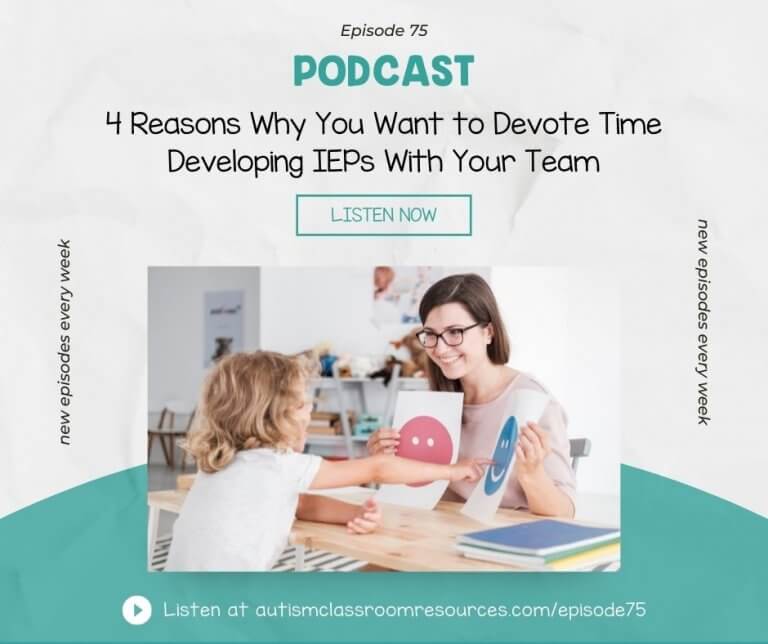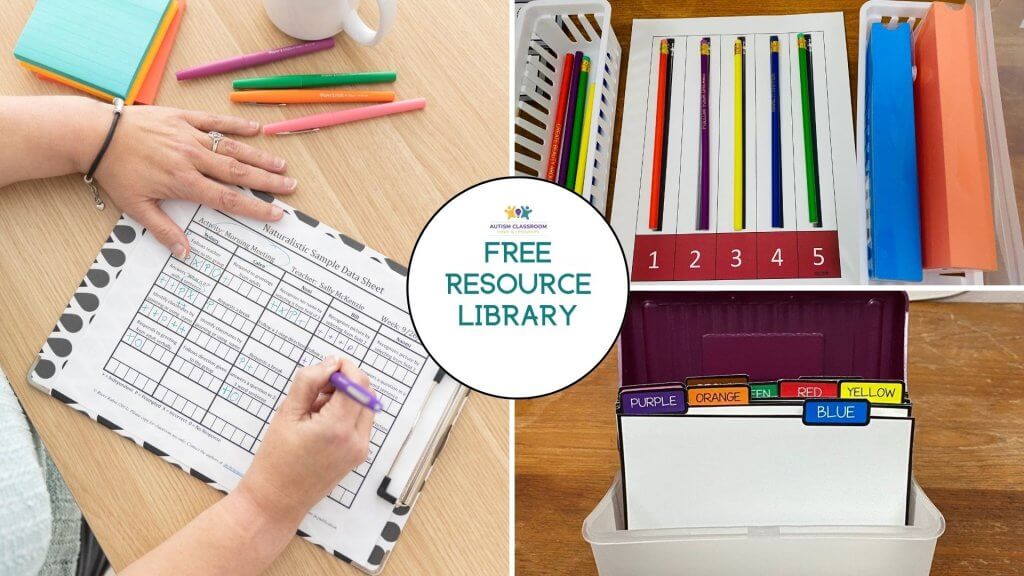Welcome to the Autism Classroom Resources podcast, the podcast for special educators who are looking for personal and professional development. I’m your host, Dr. Christine Reeve. For more than 20 years, I’ve worn lots of hats in special education. But my real love is helping special educators like you. This podcast will give you tips and ways to implement research-based practices in a practical way in your classroom to make your job easier and more effective.
Welcome back to the Autism Classroom Resources Podcast. I’m Chris Reeve, and I’m your host. Thank you so much for joining me today. And today I’m going to kick off a new series. So, I’m very excited about that.
If you are a special educator and I assume that you are associated with special education as a family member or professional in some way, or you wouldn’t be listening, IEPs are probably not your favorite topic.
I’ll let you in on the secret. I kind of like them. Okay. Maybe like is kind of a strong word. I don’t like the marathons or the arguments. And I don’t necessarily enjoy writing them. But I can’t imagine trying to work with our students without them.
And when I’m talking about IEPs in this context, I’m talking about both the documents and the meetings, because we need them both. And as I’m recording this, we’re starting off what I consider to be for some districts the fifth season of our year, IEP season.
Some districts do anniversary dates, but some don’t. And this year I’m sure everything is completely different. But regardless, many times it feels like IEPs drive our lives. And in a sense in special ed, they do.
Because the truth is that in IEP is at the heart of special ed services. It needs to be a living, breathing document and a living, breathing process. It needs to have meaning and purpose and not just be a piece of paper that we write things on and put in a file cabinet. So obviously it has to be something that we spend a good bit of time and attention to both the document and the process by which we get there.
So, I’m going to kick off a short series of episodes talking about the IEP and how we can make sure that it lives up to what we need it to be.
And some of this I’m going to pull from workshops in Special Educator Academy and from our IEP Bootcamp there.
I truly believe that having a good IEP and then establishing the educational environment to implement it is what allows a student to flourish.
So if you are looking for more ideas about writing IEPs, come and join us. The IEP bootcamp is always open and this summer we will be having a study group going through it and you can get a 7-day free trial to get everything that we have in the Academy at specialeducatoracademy.com.
Today, I’m going to start with four reasons why we should be putting that time that I know is so precious for all of us right now, but why we should be putting that time in around the development and collaboration with the team around the IEP. So, let’s get started.
The IEP is the roadmap for the child’s education for the coming year. It outlines the services that he or she needs to make meaningful progress. It lets us plan when we plan to arrive at our destination and what types of supports we will need to get there, just like a roadmap helps me plan for my vacation. It tells us who the child is and what he needs through the present level. It outlines for the team what the hopes and the dreams are for the student. Just like my list of destinations on my map tell me what kinds of places I want to go and see. It describes what they need, and it bases the decisions about services based on what those needs are. And essentially, it sets the course for the student typically for the coming year, but you could have an IEP that is shorter than a year. It can’t be longer than a year.
Without that roadmap, we would get lost. And we might never reach that destination. And with that roadmap, when we hit a bump in the road, we get a flat tire, something happens, he gets sick, he doesn’t make the progress that we expected, or he excels and makes more progress than we expected. Then we meet and we adjust our course on our roadmap. We change our IEP. So I think that’s an analogy that actually works.
So second, the document and the meetings establish a contract of sorts between the family and the school. Yes, it’s a legal document. I get that. That’s another reason we have to do it, but I’m not getting into that. But it’s so much more than that. It’s the beginning of building trust and a relationship between the family and the school. And how well that relationship gets built, sets the course for their relationship across the board for just this year or even for longer. Because good relationships between the family and the school can cushion the blow for when there’s a problem down the line.
You know I love stories. I’ve spent a lot of time in a lot of different school years in a lot of different school districts over the years. So I’ve been in a lot of situations where families and schools are not getting along. That’s usually when I got called in. And I had the amazing opportunity of working in a district with an autism specialist who used to be, prior to that position, she used to be a speech pathologist for the preschool. So she was one of the first people that families often met when their child qualified for services. She was one of the ones who did the evaluation. She was one of the ones who met the family and shepherded them through that situation. And she was an amazing and still is an amazing person. She’s retired now. But one of the things that became increasingly parent to me as we went throughout the district, she’d been there for a long time by that point.
So she knew children who were in high school that she knew as preschoolers. She knew middle schoolers when they were in preschool. She had long relationships with these families. And we would find a situation where maybe there was a brand new teacher or a teacher had turned over multiple times in a classroom and things weren’t going very well for that child and their family and their family was understandably very, very frustrated. And we would come in and because I was with her, the families felt more at ease because they knew that if I was with the speech pathologist, it was going to get taken care of. They trusted her. And that was all because they had that original trust with her back when their kids came into school. They relied on that relationship and they knew that she would make it happen. You know, we couldn’t always make it happen as fast as we wanted it to.
There were a lot of variables involved. It wasn’t as easy as just, “Hey, you can have the speech pathologist run your classroom.” But they knew they could have faith in her. And that went a long way towards addressing those issues. So it’s important that we recognize that those meetings are really important.
And third, how we write the IEP itself can make our jobs easier or harder. How we write the mastery criteria can make it easier to take data or can make it harder. I actually talked about that in episode 37. If we write it so the student has to perform a skill four out of five times daily, we have to take data on every single trial, every single day. But if we write the goal that the student will perform the skill with 80% accuracy, or that mastery will be 80% accuracy on a weekly sample, we teach the skill and he performs the skill every day, but we only have to take data once a week.
Obviously there’s a ton of other considerations that we have to take into account. But go over to autismclassroomresources.com/episode37 and I’ll make sure that that gets into the show notes as well. And you can get all the nine things to think about in writing mastery criteria to help with that.
Another thing is if we write the objectives in line with how we teach the skill, it’s going to be easier to write our progress notes. But if we write our objectives in a way that does not match the way that we teach the skill, writing those progress notes is going to be rough. If I write it by fading our prompts, but then I teach it by giving small things.
So if I write that I’m going to do addition, subtraction and multiplication, and I’m going to introduce all of them at the same time. But then I’m teaching only addition in the first quarter, it’s going to be really hard to write that progress report because I haven’t even assessed subtraction, multiplication and division because I’m only still teaching addition. So we want to make sure those things align. And I’ll talk about that in the future as well.
Number four, every time you meet, this is the time to revisit who the student is and what the team wants for him to become. And often this will include the student, not just their family. And it’s really important that we don’t assume that we know what the parents want just because they’ve been with us for a long time. One of the things that I see, it happens a lot of times in late elementary and especially in middle school and even more so in high school is people will say, “Well, we can’t do functional programming for this child because the parents won’t have it.”
And lo and behold, when you sit down with them in middle school, the parents are like, “Why aren’t we doing functional programming for my child who’s in middle school?” Well, because you said, “Never do that.” “Yeah because he was in kindergarten and y’all have just stuck with that forever.”
We have to continue to have those conversations, even when we think we know the answer, because sometimes the answer will surprise us. Those conversations we have to revisit. We have to keep talking about who this child is because he changes as a student. He isn’t the same person he was in kindergarten, when he’s in second grade and third grade and eighth grade. And his parents aren’t either. So we have to continue to have those conversations. That’s why we meet every year, at least.
So the keys to reaching all of these goals of our IEPs are good collaboration between families and schools, having well-run meetings and strongly constructed IEP documents. And I’ve written a lot about both of those over the years, and I’ll include links to them in the post for this episode. And you can find that and a transcript at autismclassroomresources.com/episode75.
In the next few episodes, I’m going to talk about how to improve the quality of the meetings and the relationships that we build with families. And I’ll talk about how you can prepare the meetings to be at your best as well as how you can advocate for your students effectively without alienating your district. Yeah, I’m going to talk about that because it’s important. And then we’ll go into what you do once the IEP is written, because we all know that it doesn’t matter what the IEP says if it doesn’t get implemented. Just like that vacation I have planned isn’t real until I actually follow my roadmap. That’s the process of designing the classroom to implement the educational programs of all your students while you’re individualizing for each one.
Easy peasy, right? Yeah, right. But I’ve got systems for you to put in place and tools for you to use and more, and I’ll walk you through it all over the summer step by step. So stay with me for more on how we get from the student you just met to the IEP, to the designing of your program for your whole classroom. And if you want to get a jump on it and you want a deeper dive or you want some hands-on support from me and a huge community of fellow educators hop over to the specialeducatoracademy.com and give us a try with a free 7- day trial.
You’ll be just in time for IEP Bootcamp that kicks off June 6th and Setting up Classrooms that kicks off July 11th. But if you missed either of those dates, both classes are open year-round, and you can take them as you want. And we are there to provide support throughout them. But this is a great time to do it with a group of like-minded educators who get your students. So come give us a try. In the meantime, hop over to the free Facebook group at specialeducatorsconnection.com. Answer the three questions and share your biggest challenge about the IEP and join the discussion. As always thank you for everything you do for your students. And I hope that I will see you back again for the next installment in this series next week.






